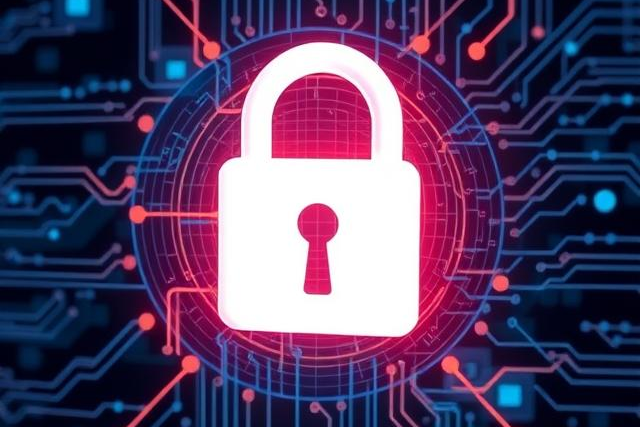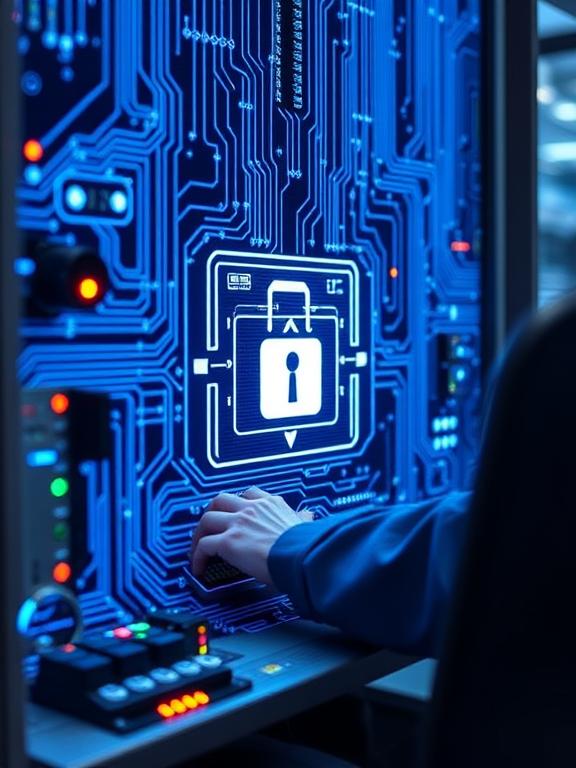
Your project’s security in good hands – see how JM elektronik protects your data
Data security is a critical—but often underestimated—factor in successful partnerships with EMS providers. While price, production quality, and on-time delivery usually top the list of evaluation criteria, ensuring the confidentiality of shared information should be among the very first considerations. Simply signing an NDA is not enough. That’s why, at JM elektronik, we place the highest importance on data security.
A contract electronics manufacturer handles vast amounts of sensitive information—from employee and customer personal data to financial records, firmware, production recipes, development plans, and delivery schedules. Because of this, information security is not just the responsibility of the IT department; it must be a core element of the entire organization’s strategy.

Every step in the electronics manufacturing process—from design to production—contains valuable know-how, often developed over years. Breaches in data security can cause significant financial losses and damage the reputation and long-term success of the OEM.
The risk increases when design modifications are made maliciously, such as by introducing security vulnerabilities or hidden malicious code. In industries like defense, IoT, or telecommunications, even minor alterations to code or devices can open doors to espionage, hacking, or sabotage.
Unauthorized use of technological designs also leads to the market being flooded with cheap counterfeits, weakening the manufacturer’s position, cutting profits, and eroding customer trust. This risk exists whether manufacturing is done in-house or through external partners. Therefore, working within a transparent legal framework that respects intellectual property and provides clear contractual safeguards is crucial.
A trustworthy and knowledgeable EMS partner employs comprehensive legal, organizational, and technical safeguards to mitigate these risks.
By thoroughly analyzing the work environment, an airtight security system can be established across all layers—legal, organizational, and technical. Organizational maturity combined with ongoing risk assessments ensures best practices for managing clients’ intellectual property are integrated into daily operations.
Protection relies on proven technologies such as firewalls, antivirus systems, encryption of data in transit and at rest, and regular backups. Project data encryption, strict access control, supply chain security, and security audits have become essential standards to safeguard innovation and brand reputation.
Additionally, advanced tools like Data Loss Prevention (DLP) systems, multi-factor authentication (MFA), network segmentation, and IoT security are increasingly adopted. Regular audits further strengthen these defenses, creating a robust protective barrier for manufacturing and commercial operations.
Cyberattacks often result in order delays, contract breaches, and dissatisfied customers. Loss of system control can halt assembly lines instantly and block shipment of critical components.
While the immediate financial losses are severe, the erosion of partner trust can be even more damaging. In an industry where lead times and consistent quality are vital, even a brief disruption can undermine years of successful collaboration.
Building digital resilience is no longer optional—it’s essential. Without it, speed and precision in manufacturing become meaningless when systems are compromised.

Key to data security in outsourcing partnerships is eliminating unauthorized access to software and hardware during production.
Security vulnerabilities in IoT devices often arise during production, for example, through “backdoors” introduced by poorly controlled partners. That’s why securing the programming process with encryption, unique keys, and strict access restrictions is critical. Assigning access rights to specific devices, locations, or serial numbers enables precise tracking and prevents cloning.
Manufacturers must invest in preventative measures such as network segmentation, anomaly detection, regular backups, and strict employee access policies. These actions help prevent crises for both customers and manufacturers.
Confidentiality and data security are our top priorities. Every team member is bound by confidentiality agreements, and cooperation with contractors is secured through NDA clauses. These formal commitments are reinforced by internal policies and procedures.
We protect data at every stage of collaboration. Access to commercial and technical documents is strictly limited on a need-to-know basis. IT authorizations are tightly controlled and granted or revoked following clear procedures. Our systems are monitored by advanced DLP solutions and supported by robust infrastructure management, antivirus software, and multi-factor authentication. Redundant infrastructure minimizes downtime risks, while data storage in defined locations within the European Union ensures compliance with EU regulations.
Our production environment is also highly secure, featuring video surveillance and access control. We can trace every component involved in the manufacturing process. Operating under ISO 9001:2015 Certified Quality Management System standards, we guarantee the highest process quality and continuous improvement in customer satisfaction.
Data security is not just an IT issue; today’s threats demand a holistic approach involving everyone—from executives to operational teams and every employee. Data encompasses knowledge, customer relationships, know-how, and core processes—loss of which can cripple a business.
Outsourcing electronics manufacturing is a strategic decision that requires partnering with a company meeting the highest security standards. At JM Elektronik, we understand the importance of safeguarding information flow. Confidentiality is at the heart of contract manufacturing, enabling our clients to develop products and grow their businesses safely and confidently.
Choosing a manufacturer that prioritizes data security is an investment in business continuity, customer trust, and competitive advantage. A comprehensive security policy, regular training, appropriate technologies, and ongoing audits effectively minimize risk.
In our upcoming article, we will present a detailed overview of the technical foundations behind effective PCBA quality assurance.
We look forward to partnering with you!

